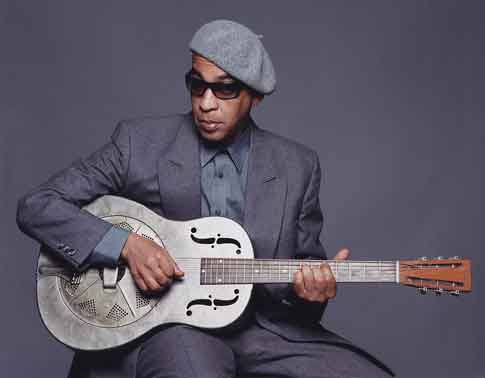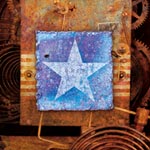October 03, 2006
Hauntological blues

- Dub messes big time with such notions of uncorrupted temporality. Wearing a dubble face, neither future nor past, Dub is simultaneously a past and future trace: of music as both memory or futurity, authentic emotion and technological parasitism. Ian Penman, '[the Phantoms of] TRICKNOLOGY [versus a Politics of Authenticity]'
Since we're talking about hauntology, we ought to have mentioned Beloved by now: not only Morrison's novel, but also Demme's astonishing film. It's telling that Demme is celebrated for his silly grand guignol, The Silence of the Lambs, while Beloved is forgotten, repressed, screened out. Hopkins' pantomime ham turn as Lecter surely spooks no-one , whereas Thandie Newton's automaton-stiff, innocent-malevolent performance as Beloved is almost unberable: grotesque, disturbing, moving in equal measure.
Like The Shining - a film that was also widely dismissed for nigh on a decade - Beloved reminds us that America, with its anxious hankerings after an 'innocence' it can never give up on, is haunted by haunting itself. If there are ghosts, then what was supposed to be a New Beginning, a clean break, turns out to be a repetition, the same old story. The ghosts were meant to have been left in the Old World .... but here they are...
Whereas The Shining digs beneath the hauntological structure of the American family and finds an Indian Burial Ground, Beloved pitches us right into the atrocious heart of America's other genocide: slavery and its aftermath. No doubt the film's commercial failure was in part due to the fact that the wounds are too raw, the ghosts too Real. When you leave the cinema, there is no escape from these spectres, these apparitions of a Real which will not go away but which cannot be faced. Some IMDB viewers complain that Beloved should have been reclassifed as Horror... well, so should American history...

Beloved comes to mind often as I listen to Stone Cold Ohio, the outstanding new LP by Little Axe. Little Axe have been releasing records for over a decade now, but, in the 90s, my nervous system amped up by jungle's crazed accelerations, I wasn't ready to be seduced by their lugubrious dub blues. In 2006, however, the haunted bayous of Stone Cold Ohio take their place alongside Burial's phantom-stalked South London and Ghost Box's abandoned television channels in hauntological Now. Since I received Stone Cold Ohio last week, I've listened to listen else; and when I wasn't immersed in Stone Cold Ohio I was re-visiting the other four Little Axe LPs. The combination of skin-tingling voices (some original, some sampled) with dub space and drift is deeply addictive. Little Axe's world is entrancing, vivid, often harrowing; it's easy to get lost in these thickets and fogs, these phantom plantations built on casual cruelty, these makeshift churches that nurtured collective dreams of escape...
Shepherds...
Do you hear the lambs are crying?
Little Axe's records are wracked with collective grief. Spectral harmonicas resemble howling wolves; echoes linger like wounds that will never heal; the voices of the living harmonise with the voices of the dead in songs thick with reproach, recrimination and the hunger for redemption. Yet utopian longings also stir in the fetid swamps and unmarked graveyards; there are moments of unbowed defiance and fugitive joy here too.
I know my name is written in the Kingdom....
Little Axe is Skip McDonald's project. Through his involvement with the likes of Ohio Players, the Sugarhill Gang and Mark Stewart, McDonald has always been associated with future-orientated pop. If Little Axe appear at first sight to be a retreat from full-on future shock - McDonald returning to his first encounter with music, when he learned blues on his father's guitar - we are not dealing here the familiar, tiresome story of a 'mature' disavowal of modernism in the name of a re-treading of Trad form. In fact, Little Axe's anachronistic temporality can be seen as yet another rendering of future shock; except that this time, it is the vast unassimilable trauma, the SF catastrophe, of slavery that is being confronted. (Perhaps it always was...)

Even though Little Axe are apt to be described as 'updating the blues for the 21st century' they could equally be seen as downdating the 21st century into the early 20th. Their dyschronia is reminiscent of those moments in Stephen King's It where old photographs come to (a kind of) life, and there is a hallucinatory suspension of sequentiality. Or, better, to the time slips in Octavia Butler's Kindred, where contemporary characters are abducted back into the waking nightmare of slavery. (The point being: the nightmare never really ended...)
There is no doubt that blues has a privileged position in pop's metaphysics of presence: the image of the singer-songwriter alone with his guitar provides rockism with its emblem of authenticity and authorship. But Little Axe's return to the supposed beginnings unsettles this by showing that there were ghosts at the origin. Hauntology is the proper temporal mode for a history made up of gaps, erased names and sudden abductions. The traces of gospel, spirituals and blues out of which Stone Cold Ohio is assembled are not the relics of a lost presence, but the fragments of a time permanently out of joint. These musics were vast collective works of mourning and melancholia. Little Axe confront American history as a single 'empire of crime', where the War on Terror decried on Stone Cold Ohio's opening track - a post 9/11 re-channeling of Blind Willie Johnson's 'If I had My Way' - is continuous with the terrordome of slavery.
When I interviewed Skip last week for Fact, he emphasised that Little Axe tracks always begins with the samples. The origin is out of joint. He has described before the anachronizing Method-ology he uses to transport himself into the past. 'I like to surf time. What I like to do is study time-periods - get right in to 'em, so deep it gets real heavy in there.' McDonald's deep immersion in old music allows him to travel back in time and the ghosts to move forward. It is a kind of possession (recalling Winfrey's claim that she and the cast were 'possessed' when they were making Beloved). The capacity to allow yourself to be possessed is the mark of all great performers.* Little Axe's records skilfully mystify questions of authorship and attribution, origination and repetition. It is difficult to disentangle sampling from songwriting, impossible to draw firm lines between a cover version and an original song. Songs are texturally-dense palimpsests, accreted rather than authored. McDonald's own vocals, by turns doleful, quietly enraged and affirmatory, are often doubled as well as dubbed. They and the modern instrumentation repeatedly sink into grainy sepia and misty trails of reverb, falling into a dyschronic contemporeanity with the crackly samples.
Ian's recent tilt at Greil Marcus echoes the misgivings he expressed in his landmark piece on Tricky (the piece, really, in which Sonic Hauntology was first broached). There, Ian complained about Marcus' 'measured humanism which leaves little room for the UNCANNY in music'. Part of the reason Little Axe are intriguing is that their use of dub makes it possible for us to encounter blues as uncanny and untimely again. Little Axe position blues not as part of American history, as Marcus does, but as one corner of the Black Atlantic. What makes the combination of blues and dub far more than a gimmick is that there is an uncanny logic behind the superimposition of two corners of the Black Atlantic over one another.
Adrian Sherwood's role in the band is crucial. Sherwood has said that Little Axe take inspiration from the thought that there is a common ground to be found in 'the music of Captain Beefheart and Prince Far I, King Tubby and Jimi Hendrix'. In the wrong hands, a syncresis like this could end up as a recipe for stodgy, Whole Earth humanism. But Sherwood is a designer of OtherWorld music, an expert in eeriness, a kind of anti-Jools Holland . What is most pernicious about Holland is the way in which, under his stewardship, pop is de-artificialized, re-naturalized, blokily traced back to a facialized source. Dub, evidently, goes in exactly the opposite direction - it estranges the voice, or points up the voice's inherent strangeness. When I interviewed Sherwood last week he was delighted by my description of his art as 'schizophonic' - Sherwood detaches sounds from sources, or at least occults the relationship between the two. The tyranny of Holland's Later... has corresponded with the rise of no-nonsense pop which suppresses the role of recording and production. But 'Dub was a breakthrough because the seam of its recording was turned inside out for us to hear and exult in; when we had been used to the "re" of recording being repressed, recessed, as though it really were just a re-presentation of something that already existed in its own right.' (Penman)
Hence what I have called dubtraction; and what is subtracted, first of all, is presence. Chion refers to the voice that is detached from a source as acousmatic. The dub producer, then, is an acousmatician, a manipulator of sonic phantoms that have been detached from live bodies. Dub time is unlive, and the producer's necromantic role - his raising of the dead - is doubled by his treating of the living as if dead. For Little Axe, as for the bluesmen and the Jamaican singers and players they channel, hauntology is a political gesture: a sign that the dead will not be silenced.
I'm a prisoner
Somehow I will be free
Hauntological addenda
It's no accident that Ian's remarks on hauntology were prompted by Tricky, and who - as Ian mentions - should have helped produce Maxinquaye if not Mark Stewart?
Another hauntological On-U connection is African Headcharge. The African Headcharge LPs are masterpieces of OtherWorld music: eerie, abstract slices of rhythmic psychedelia. Sherwood came up with the concept of African Headcharge after hearing Eno remark that My Life in the Bush of Ghosts was intended to be a 'vision of a psychedelic Africa'. Sherwood has completed a new African Headcharge LP and its title will be ... Vision of a Psychdelic Africa.
*And exactly what someone like Robbie Williams, and this is the pathology of his postmodernism, is unable to do; he is always falling over himself to advertise his apes and japes as citations, over which his majesty the Ego prevails.
My On-U piece, which includes interviews with Skip McDonald, Adrian Sherwood and Mark Stewart, will be appearing very soon on the Fact website.
Little Axe are playing an acoustic set at Ray's Jazz in Foyle's bookshop, Charing Cross Road, next Monday, 9th October, at 6 PM. Admission free.
Posted by mark at October 3, 2006 11:56 PM | TrackBack